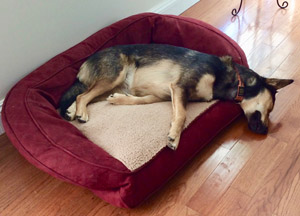dog sleeping Wendy S Wilson

Photo by Wendy Smith Wilson, DVM
It was like those Robitussin commercials where the wife can’t sleep because the husband is coughing, coughing, coughing. Except in this case, the coughing culprit was not the husband, but Portia de Rossi, a 10-year-old Bichon Frise. The effect, however, was the same: PdR’s parents could not get a peaceful night’s sleep. Eventually, dog-tired (yes, the pun is intentional), they brought PdR in for an exam.
The first thing that jumped out on the exam was the loud heart murmur, something that had not been heard previously. Touch the windpipe and PdR coughed like a trained seal barking. “A bit ticklish of the throat, it seems,” I commented to PdR’s mother.
Now, in many cases coughing could be a sign of congestive heart failure – a buildup of fluid in the lungs. With the loud murmur, the first tendency is to want to jump to that conclusion. Many veterinarians use this “math” to get to the answer:
Murmur + cough = congestive heart failure.
But this equation has a flaw.
Lots of older dogs cough for lots of reasons. And lots of older dogs have murmurs, usually because of a leaky mitral valve (the valve that separates the two chambers on the left side of the heart). When this valve leaks badly enough, fluid builds up in the lungs, causing shortness of breath, and, often, coughing – a syndrome known as “congestive heart failure.” However, if the leak is small, then the coughing is unrelated to the heart disease, and only coincidental. And the therapies for different causes of coughing can differ.
So how can we tell why the dog is coughing?
Many veterinarians use a more sophisticated “math” to help them:
Murmur + cough + big heart on chest X-rays = congestive heart failure.
But even this equation is flawed because evaluating heart size and presence of fluid in the lungs from radiographs is difficult. Even cardiologists struggle with this on occasion. Unlike people, dogs’ chests are all different shapes and sizes: deep-and-narrow (like in a Dobermann), shallow-and-wide (like a Pomeranian), or anywhere in between. There’s no consistency. You have to learn all the variations for all the different breeds and types and try to figure out what the true heart size is for each of these. On top of that, there is the issue of breathing. When we human animals go in for a chest X-ray, the radiographer gets us into position, makes us take a deep breath and hold it. However, when Miss PdR is placed onto the table to get an X-ray, she squirms, wriggles, and pants. Consequently, the films are often taken when she has deflated her lungs (breathed out), making everything in her chest look white, like it has fluid in it.
So the math gets even more complicated:
Murmur + cough + big heart on chest X-rays + cough clears up with furosemide (diuretic used to treat CHF) = congestive heart failure.
That sounds pretty solid! If I give a drug for heart failure and the cough resolves, it must be heart failure.
Whoa! Not so fast, Sherlock!
Unfortunately, furosemide (Lasix) also acts on the airways, causing them to dilate, and also on the nerves of the larynx, causing a cough from any cause to be suppressed or reduced. Therefore, we can’t use “coughing got better with Lasix” as proof that our diagnosis of CHF was correct!
So, what's the right equation? What's the correct "math"?
Turns out, it's rather simple. Most of it can be gleaned from the physical exam and history, and a simple at-home test. And it all comes down to breathing.
As a little dog with mitral valve disease progresses into congestive heart failure, the lungs start to fill up with a bit of fluid. This makes it a little harder to breathe. And so the breathing rate increases. At some point, the fluid buildup is severe enough that the breathing rate is high and the dog is short of breath at rest.
We can measure the breathing rate at rest, or better yet, when Miss PdR is sleeping. If the breathing rate in the vet hospital is normal (less than 30), the probability of congestive heart failure is really, really low. Of course, Miss PdR panted the whole time she was in the hospital because of anxiety – she is soooo high-strung and high maintenance! Since there was no history of her having breathing difficulty, her parents were sent home with instructions to count her sleeping respiratory rate. Again, the magic number is 30 breaths/minute. It’s even better if we can get a nice baseline over several days to know what “normal” is for Miss PdR. And if you can’t easily figure out how to count it, there are videos here to help you learn.
So, Miss PdR and her parents went home, and after the weekend, reported back that the sleeping respiratory rate was only 18 breaths per minute, well below the 30 breaths per minute that would cause us concern. Not only was the cough not due to congestive heart failure, but we had a nice baseline from which we could base future decisions. Her treatment was directed at her respiratory disease, and the cough resolved sufficiently to allow everybody to get a good night’s sleep. And her owners could continue to monitor the sleeping respiratory rate once or twice a week to see if, at some point in the future, Portia de Rossi develops heart failure and needs treatment for that.
Canine Sleeping Respiratory Rate
Feline Sleeping Respiratory Rate
Canine Resting Respiratory Rate
3 Comments
Nancy
November 17, 2022
Tracey Giambrone, DOM
January 31, 2022
Eileen
December 13, 2020